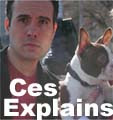It has been almost a month since he died and I haven't been able to get Gary Webb out of my mind.Please read the whole column.
You remember Gary Webb, don't you? He's the investigative reporter who in 1996 produced a series of stories for the San Jose Mercury News called "Dark Alliance," on the connections between the Central Intelligence Agency and the Nicaraguan contras, the right-wing opposition to the leftist Sandinista regime in that Central American nation.
The series' most explosive charge was that a contra-connected drug gang helped fuel the crack epidemic of the 1980s in this country by bringing in large supplies of Colombian cocaine and selling them to black street gangs in Los Angeles, all with the knowledge and, to some extent, the protection of the CIA.
Webb's series, and that allegation especially, touched off a firestorm of criticism in both the government and the media. Not only did the CIA deny his allegations, but three high temples of the American establishment--The New York Times, the Los Angeles Times and The Washington Post--all joined in knocking down Webb's stories. Eventually, even his own editor at the Mercury News effectively disavowed him and the series.
Gary Webb himself became radioactive within the newspaper industry and went to work in California state government. When he died last month at age 49, ostensibly of a self-inflicted gunshot wound to the head, he was jobless and, apparently, hopeless.
I have a confession to make: I still think Gary Webb had it mostly right.
I am very impressed by Wycliff's decision to publicly reexamine Webb's series.
Most mainstream media used Webb's death as an opportunity to dismiss "Dark Alliance" as the misguided product of "a clearly troubled man." Nearly all of the major media obituaries were centered on some variation on this sentence from the AP: "Major parts of his reporting were later discredited by other newspaper investigations. "
But they failed to mention that the central thesis of the series -- not that the CIA of directly aided drug-dealing to raise money for the Contras, but that the agency was aware of the activity -- was never refuted. In fact, a 1997 CIA inspector general's report acknowledged that the CIA had indeed worked with suspected drugrunners while supporting the contras.
It is a rare act of journalistic courage for someone in Wycliff's position to dust-off a story that has been dismissed by journalistic consensus.













No comments:
Post a Comment